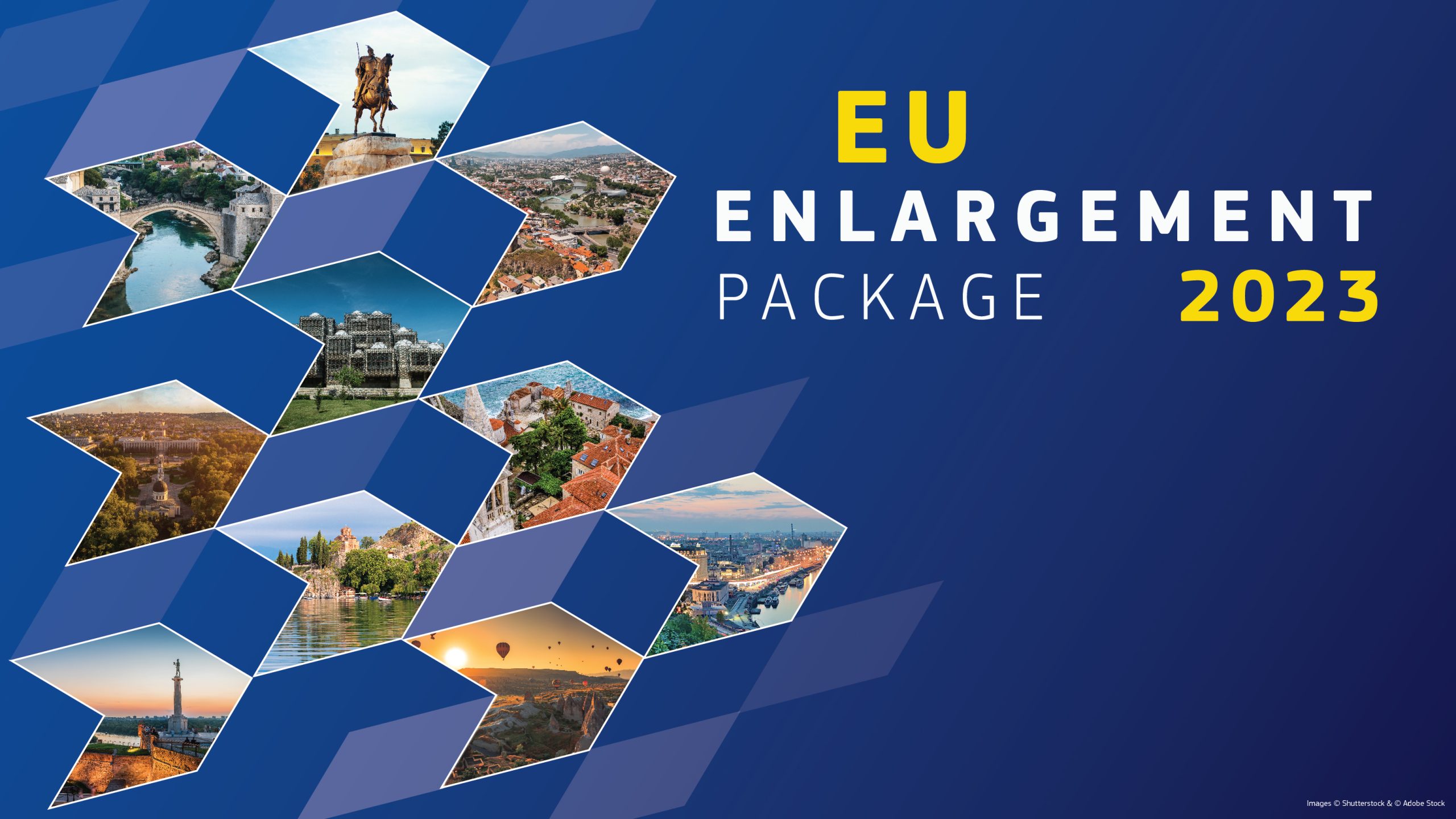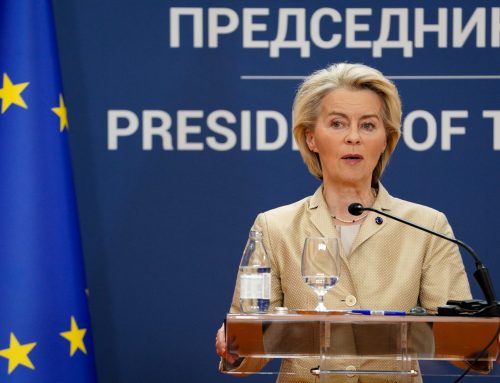Today, the European Commission adopted the 2023 Enlargement Package, providing a detailed assessment of the state of play and the progress made by Albania, Bosnia and Herzegovina, Kosovo, Montenegro, North Macedonia, Serbia, Türkiye, and for the first time also Ukraine, the Republic of Moldova and Georgia on their respective paths towards accession to the European Union. In particular, the report focuses on the progress in the implementation of fundamental reforms, as well as on providing clear guidance on the reform priorities ahead. Accession is and will remain a merit-based process, fully dependent on the objective progress achieved by each country.
In light of the results achieved by Ukraine and Moldova, and of the ongoing reform efforts, the Commission has recommended that the Council opens accession negotiations with both countries. Furthermore, the Commission recommends that Council adopts the negotiating frameworks once Ukraine and Moldova have adopted certain key measures. The Commission stands ready to report to Council by March 2024 on the progress relating to these measures.
In the case of Georgia, in light of the results achieved, the Commission recommends that the Council grants Georgia the status of a candidate country on the understanding that a number of steps are taken.
When it comes to Bosnia and Herzegovina, the Commission recommends the opening of accession negotiations with Bosnia and Herzegovina once the necessary degree of compliance with the membership criteria is achieved. The country needs to apply further efforts to fulfil the key priorities set out in the Commission Opinion on its EU membership application. The Commission will continuously monitor the progress and compliance in all areas related to the opening of negotiations and report to the Council at the latest in March 2024.
European Commission President, Ursula von der Leyen, said: “Enlargement is a vital policy for the European Union. Completing our Union is the call of history, the natural horizon of our Union. Completing our Union, also has a strong economic and geopolitical logic. Past enlargements have shown the enormous benefits both for the accession countries and the EU. We all win.”
In Ukraine, the decision to grant EU candidate status created a powerful reform dynamic, despite the ongoing war, with strong support from the people of Ukraine. The Ukrainian government and Parliament demonstrated resolve in making substantial progress on meeting the 7 steps of the European Commission Opinion on Ukraine’s EU membership application. Ukraine has established a transparent pre-selection system for the Constitutional Court judges and reformed the judicial governance bodies. It has further developed its track record of high-level corruption investigations and convictions and strengthened its institutional framework. Ukraine has taken positive steps in a wider and systemic effort to address the influence of oligarchs. The country has also demonstrated its capacity to make progress in aligning with the EU acquis, even during wartime.
Moldova has made important progress on meeting the 9 steps set out in the Commission Opinion on Moldova’s EU membership application. It launched a comprehensive justice reform following the Venice Commission recommendations, including by evaluating prominent judges and prosecutors. The country reformed its anti-corruption bodies and increased the number of investigations and convictions in corruption cases. Moldova adopted a deoligarchisation action plan, which it implements following set timelines. New legislation to set up a confiscation mechanism helps fight organised crime. The country adopted a public administration strategy and follows the reform at all levels. It worked to reform its public finance management and adopted legislation to reform public procurement. Moldova enhanced the participation of civil society in the decision-making process and has strengthened the protection of human rights.
Georgia has taken steps to strengthen engagement with the EU and increased pace of reforms in the recent months. To address the twelve priorities identified in the Commission Opinion on its membership application, Georgia has adopted legislative acts and policy actions on gender equality, on fighting violence against women and organised crime, as well as on taking into account European Court of Human Rights judgments. A judicial reform has been brought forward although a holistic reform of the High Council of Justice is still needed. Georgia has shared laws as well as its action plan for deoligarchisation with the Venice Commission for an opinion. A strategy on the protection of human rights was adopted and an action plan is being elaborated. A memorandum of cooperation with civil society representatives was concluded. Building a strong cross-party political consensus would contribute to addressing polarisation and accelerate its European path.
Western Balkans
Progress on EU accession reforms has largely stalled, as Montenegro has suffered from deep polarisation and political instability in the reporting period. The EU welcomes the constitution of the new parliament and the formation of the government, which we expect to swiftly demonstrate its capacity and commitment to Montenegro’s EU path and deliver on EU accession related reforms. Overall, progress is in the accession negotiations will depend on reforms in the area of rule of law (i.e. meeting the interim benchmarks set out in Chapters 23 and 24). Montenegro continues to fully align with the Common Foreign Security Policy.
Serbia continued the implementation of EU accession related reforms, including in the area of rule of law. Serbia started implementing the 2022 constitutional amendments to strengthen the independence of the judiciary and adopted new media legislation. The implementation of the latter can significantly improve the regulatory environment. However, further amendments will be needed to be fully in line with the EU acquis and European standards. Serbia needs to improve, as a matter of priority, its alignment with the EU’s common foreign and security policy, including restrictive measures and statements on Russia. Further work and political commitment are also needed to implement reforms in the area of rule of law. The Commission’s assessment remains that Serbia has technically fulfilled the benchmarks to open cluster 3 (competitiveness and inclusive growth). Serbia must fully cooperate and take all the necessary steps to ensure accountability for the violent attack on Kosovo Police of 24 September and the attack on KFOR on 29 May. On the normalisation of relations with Kosovo, whilst an Agreement was reached in the EU-facilitated Dialogue, both Serbia and Kosovo are yet to start the implementation of their respective obligations, which are binding for the Parties and a key part of their European paths.
In North Macedonia, the authorities have consistently stated that EU accession remains their strategic goal. North Macedonia has continued to fully align with the EU Common Foreign and Security Policy (CFSP). The country has also made some progress in in the area of justice, freedom and security, including the fight against organised crime and the management of migration. As a negotiating country, North Macedonia needs to deliver on the implementation of EU related reforms, including in the judiciary, the fight against corruption and organised crime, public administration reform, including management of public finances, and public procurement. North Macedonia has committed to launch and achieve the relevant constitutional changes as a matter of priority, with a view to include citizens who are part of other people. The screening process of the EU acquis has progressed smoothly, and the authorities have shown a high level of commitment. The Commission presented to Council the screening reports on the “fundamentals cluster” for North Macedonia in July and looks forward to a swift follow up, with a view to opening negotiations on this cluster by the end of the year.
Albania continued to demonstrate its determination to implement EU reforms and to make progress in reforms under the “fundamentals cluster”. Continued full alignment with EU’s CFSP was also a strong signal of the country’s strategic choice of EU accession. Further efforts are needed on freedom of expression, minority issues and property rights, as well as in key areas of the rule of law, such as the fight against corruption and organised crime. The screening process of the EU acquis has progressed smoothly, and the authorities have shown a high level of commitment. The Commission presented to Council the screening reports on the “fundamentals cluster” for Albania in July and looks forward to a swift follow up. It aims to open accession negotiations on cluster 1 (fundamentals) by the end of the year.
In Bosnia and Herzegovina, last year’s candidate status brought a much-needed positive dynamic. A new government has been set up swiftly after elections and has started to deliver on reforms, specifically through the amendments introducing integrity checks in the judiciary. Yet, further efforts are needed. This includes adopting important rule of law and judicial reforms and moving forward with constitutional and electoral reforms, which are of utmost priority to ensure equal rights for all citizens. It is also important to preserve the constitutional order of the country. The secessionist and authoritarian measures introduced in the Republika Srpska entity are not in line with the EU path. Further efforts are required for Bosnia and Herzegovina to fulfil the key priorities set out in the Commission’s Opinion on its member application. Therefore, the Commission recommends the opening of EU accession negotiations with Bosnia and Herzegovina, once the necessary degree of compliance with the membership criteria is achieved.
Kosovo remained committed to its European path. It continued to voluntarily fully align with the EU’s CFSP, including on condemnation of Russia’s war of aggression against Ukraine and to adopt restrictive measures against it. The reporting period witnessed legislative achievements, including an important electoral reform. However, more work needs to be done, including on the action plan on justice reforms. On 1 January 2024, visa liberalisation for Kosovo will enter into force. The situation in the north of Kosovo has been affected by several crises, the latest one being the violent attack against Kosovo police on 24 September 2023. On the normalisation of relations with Serbia, whilst an Agreement was reached in the EU-facilitated Dialogue, both Kosovo and Serbia are yet to start the implementation of their respective obligations, which are binding for the Parties and a key part of their European paths.
Türkiye remains a key partner for the European Union and a candidate country, but accession negotiations remain at a standstill since 2018, in line with the decision of the European Council. The country has not reversed the negative trend of moving away from the European Union, and it pursued accession related reforms to a limited degree. Cooperation with Türkiye in areas of joint interest continued in essential areas such as counter-terrorism, economy, energy, food security, migration and transport. Türkiye needs to take decisive steps to significantly improve alignment with the EU’s CFSP and step up cooperation on preventing and detecting circumvention of restrictive measures.Following the tasking by the European Council, the High Representative and the Commission will submit in November a report to the Council on the state of play of EU-Türkiye relations, building on the instruments and options identified by the European Council and with a view to proceeding in a strategic and forward-looking manner.
Next steps
It is now for the Council to consider today’s recommendations of the Commission and take decisions on the steps ahead in the enlargement process.
For more information
For more general information




